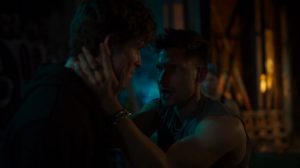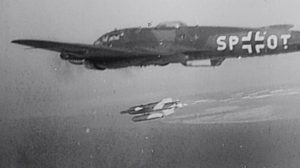Freefalling: (verb) moving downward under the force of gravity only; fall rapidly.
This begs the question: who will survive the fall?
Last week on 21 Thunder, we were left wondering the purpose behind Nolan’s (RJ Fetherstonhaugh) prison visit to his father Declan (Colm Feore). We didn’t have to wait long to find out, but more on that in a moment.
 This week, the team ventured into the world of public relations, having donated time to the “Concordia Open Door Festival,” a.k.a. the Concordia Fall Festival?
This week, the team ventured into the world of public relations, having donated time to the “Concordia Open Door Festival,” a.k.a. the Concordia Fall Festival?  Team members were required to engage with their young fans, signing autographs and assistant coaches Christy Cook (Stephanie Bennett) and Davey Gunn (Ryan Pierce) dove into the action, each leading a team of youngsters in an exhibition soccer match. Going deep, sparks flew both on and off the pitch with these two on screen.
Team members were required to engage with their young fans, signing autographs and assistant coaches Christy Cook (Stephanie Bennett) and Davey Gunn (Ryan Pierce) dove into the action, each leading a team of youngsters in an exhibition soccer match. Going deep, sparks flew both on and off the pitch with these two on screen.
 In other news, it seems Mr. Bamba (Clauter Alexandre) did indeed defraud Junior Lolo (Emmanuel Kabongo) of all his money. And I think it is reasonable to assume that Mr. Bamba may still believe Junior is an easy mark. The introduction to Fatima Gossa (Gabrielle Graham)Â seemed innocent enough, kicking the soccer ball at Junior; it led to small chat, junk food and a bit of dancing later. But by the episode’s end, we saw her willingly(?) getting into a car with none other than Mr. Bamba. And so did Junior.
In other news, it seems Mr. Bamba (Clauter Alexandre) did indeed defraud Junior Lolo (Emmanuel Kabongo) of all his money. And I think it is reasonable to assume that Mr. Bamba may still believe Junior is an easy mark. The introduction to Fatima Gossa (Gabrielle Graham)Â seemed innocent enough, kicking the soccer ball at Junior; it led to small chat, junk food and a bit of dancing later. But by the episode’s end, we saw her willingly(?) getting into a car with none other than Mr. Bamba. And so did Junior.
We also learned Stefan (Kevin Claydon) has fallen hard in his affair with team physiotherapist Marie Tremblay (Kimberly Laferriere), who happens to also be the fiancée of first team star Damien Lacroix (Lucas Chartier-Dessert).
Then we watched team intern Lara Yun (Eileen Yi) delve deeper into the world of illegal sports betting, convincing referee Guy Desjardins (Trevor Hayes) to toss a game in order to pay off three outstanding mortgages. And finally, team captain Alex (Andres Joseph) was accepted to Cornell. All in all, a busy episode, even without the Nolan/”Special K” action.
 And that brings us to Nolan and Kevin, and of course, Declan. The cold open saw Nolan feigning sickness and ditching both practice and the team meeting. Knowing “Special K” (Kyle Mac) was upset about his missing drugs, Nolan made himself accessible to K and his crew. No doubt as planned, their meeting went south quickly for K as an unknown party pulled up in a big shiny black Escalade whose driver “encouraged” K to go for a ride. Turns out Kevin was summoned to the prison where his boss, John Mangano Jr. (Bruce Ramsay), was waiting in the conjugal visit trailer. Unbeknownst to K, Mr. Mangano had sold his substantial debt to none other than Declan Gallard. Seems Kevin is now in the employ of both Declan and Nolan, with Declan summarily ordering K to leave “Nolan alone and let him play footie.”
And that brings us to Nolan and Kevin, and of course, Declan. The cold open saw Nolan feigning sickness and ditching both practice and the team meeting. Knowing “Special K” (Kyle Mac) was upset about his missing drugs, Nolan made himself accessible to K and his crew. No doubt as planned, their meeting went south quickly for K as an unknown party pulled up in a big shiny black Escalade whose driver “encouraged” K to go for a ride. Turns out Kevin was summoned to the prison where his boss, John Mangano Jr. (Bruce Ramsay), was waiting in the conjugal visit trailer. Unbeknownst to K, Mr. Mangano had sold his substantial debt to none other than Declan Gallard. Seems Kevin is now in the employ of both Declan and Nolan, with Declan summarily ordering K to leave “Nolan alone and let him play footie.”
 Nolan later made his own way to the prison, albeit voluntarily, for a status report from his mob boss father. Seems there was a significant price for his little transgression with K? And daddy wanted him to pay with weekly visits. I smell a lying, dirty stinky rat.
Nolan later made his own way to the prison, albeit voluntarily, for a status report from his mob boss father. Seems there was a significant price for his little transgression with K? And daddy wanted him to pay with weekly visits. I smell a lying, dirty stinky rat.
 Following all of the festival sequences, we closed out the episode in celebration of Emma’s (Clark Backo) acceptance to medical school. But who decided to crash the celebrations? Kevin. Clearly, he has no intention of following Declan’s orders when it comes to his buddy Nolan, but Nolan proved he still has his gangland moves. Trouble is, how much of that former life is going to spill into his new life as a footballer? We know it already is, as evidenced by tonight’s closing shot!
Following all of the festival sequences, we closed out the episode in celebration of Emma’s (Clark Backo) acceptance to medical school. But who decided to crash the celebrations? Kevin. Clearly, he has no intention of following Declan’s orders when it comes to his buddy Nolan, but Nolan proved he still has his gangland moves. Trouble is, how much of that former life is going to spill into his new life as a footballer? We know it already is, as evidenced by tonight’s closing shot!
 My Laugh-Out-Loud moment: coach Rocas (Conrad Pla) asked assistant coach Davey Gunn if he is sleeping with  assistant coach Christy Cook—before they did sleep together, and after a very, pregnant pause Davey replied: “I honestly can’t remember.” OH MY WORD, these faces! (Admittedly, the humour was lost when I crawled back and replayed this four-second scene more than 10 times to get the captures I wanted, but the first time I watched it I LOL’ed)
My Laugh-Out-Loud moment: coach Rocas (Conrad Pla) asked assistant coach Davey Gunn if he is sleeping with  assistant coach Christy Cook—before they did sleep together, and after a very, pregnant pause Davey replied: “I honestly can’t remember.” OH MY WORD, these faces! (Admittedly, the humour was lost when I crawled back and replayed this four-second scene more than 10 times to get the captures I wanted, but the first time I watched it I LOL’ed)
So we are once again left with several questions for next week:
1. Will Declan ask Nolan to get involved with some of his more nefarious goings on? And how is Kevin going to figure into those activities?
2. How is Fatima going to play out in the Junior/Mr. Mamba storyline? Is she a bad girl playing good, or a good girl in a jam?
3. Will Guy go through with it and throw a match for Lara, and will it affect her position as team intern or medical school?
4. How will Christy and Davey’s new status affect the team? Or will it? Or, is it even a status?
I loved this tightly-scripted episode. At first, I was not truly feeling the Thunder Love, however, this episode won me over. The chemistry between the actors is superb! Subtle glances, body language; it all works. Overall the writing is strong, and I for one am curious to see how the stories play out. Bravo #TeamThunder.
























